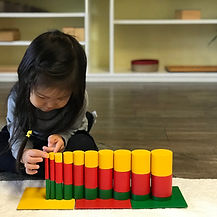
About La Jolla Village Montessori School:
One of our cornerstone tenants is to create a warm, cozy, home—like atmosphere to foster your child's early education journey.
Our Location & Layout
La Jolla Village Montessori School is true to the genuine Montessori tradition with our large back yard, sheltering trees and a beautiful organic garden. This provides both an outdoor classroom for children to learn about and appreciate nature, our environment and basic nutrition as well as a peaceful, familiar feel for little ones away from home.
Students enjoy helping to care for the plants and are fascinated by the lady bugs, caterpillars, butterflies and local birds that frequent our garden.
Inside children find two classrooms designed around age specifics, again with the goal of creating a truly warm, comfortable environment for learning. More details on the classrooms are available here under Our School.
Our Staff
La Jolla Village Montessori staff are fully trained and certified by the American Montessori Society as well as maintain membership in the American Montessori Society.
A common bond throughout the team: they are exceptionally dedicated and truly love what they do.
The Montessori Method
1. The aim of Montessori education is to foster competent, responsible, adaptive children who are lifelong learners and problem solvers.
2. Learning occurs in an inquiring, cooperative, nurturing atmosphere. Students increase their own knowledge through self and teacher-initiated experiences.
3. Learning takes place through the senses. Students learn by manipulating materials and interacting with others. These meaningful experiences are precursors to the abstract understanding of ideas.
4. The individual is considered as a whole. The physical, emotional, social, aesthetic, spiritual, and cognitive needs and interests are inseparable and equally important.
5. Respect and caring attitudes for oneself, others, the environment, and all life are necessary.
6. Like all Montessori classrooms, The La Jolla Village Montessori School incorporates these basic characteristics at all levels. Dedicated teachers, educated in the Montessori philosophy and methodology.
7. A partnership with the child's family, considered an integral part of the individual's total development.
8. A multi-aged, multi-graded, heterogeneous group of students.
9.A diverse set of Montessori materials, activities, and experiences, which are designed to foster physical, intellectual, creative and social independence.
10. A schedule that allows large blocks of uninterrupted time to problem solve, to see the interdisciplinary connections of knowledge, and to create new ideas.
11. A classroom atmosphere that encourages social interaction for cooperative learning, peer teaching, and emotional development.
The Montessori Mission

"Helping Children Help Themselves"
Our mission at La Jolla Village Montessori is to provide a carefully planned and stimulating environment that fosters the growth and development of each child through creative learning opportunities.
Our classrooms and Montessori materials have been specifically designed to provide diverse and culturally-sensitive learning experiences for young children while creating an excitement for exploration, discovery and achievement.
It is our intent to provide each child with a love for learning and an excellent foundation for on-going education.
Learning activities are individualized according to each child’s readiness, skills and abilities.
A child is allowed to work at his or her own pace, repeating tasks and activities as desired.
Our Goals and Objectives

La Jolla Village Montessori's Goals and Objectives are to provide young learners an individualized experience where children discover that complex concepts are the product of attainable steps.
1. Promote a positive attitude toward learning in each child
Learning activities are individualized and activities are geared to the child's needs and level of readiness.
Each student engages in learning tasks particularly appealing to her/himself, working at their own pace, repeating the task as often as they like.
This provides a series of successful achievements and instills confidence.
2. Foster self confidence in each child as an independent learner
At La Jolla Village Montessori School, tasks are designed with steps built on what the student has already mastered, minimizing the negative experience of frequent failure.
Success after success builds inner confidence in the children, assuring them that they can learn by themselves.
These confidence building activities likewise contribute to the student’s emotional development.
3. Promote the development of concentration skills for an ongoing learning experience
Effective learning presupposes the ability to listen carefully and to attend to what is said or demonstrated.
Through a series of absorbing experiences, the student forms habits of extended attention. Extended attention provides an increased ability to concentrate as well as improved follow through with actions or tasks.
4. Foster an abiding sense of curiosity in each child
A deep, persistent and abiding curiosity is a prerequisite for lifelong creative learning.
Montessori Methods provide students opportunities to discover qualities, dimensions, and relationships amidst a rich variety of stimulating learning situations.
Your child's natural desire to comprehend is developed into a habit of curiosity in their earliest education environment and will benefit them through life.
